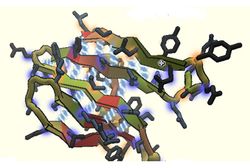 While most in the media are talking about how video gamers solved a long-standing problem in AIDS research, correctly identifying the structure of a virus, I think the open source angle matters a lot more.
While most in the media are talking about how video gamers solved a long-standing problem in AIDS research, correctly identifying the structure of a virus, I think the open source angle matters a lot more.
Because this was open source science. Instead of holding the problem within a small community, a proprietary approach favored by both universities and corporations, the problem was let out into the wild, through a video game system called Foldit, and solved within 10 days.
Credit goes to the Foldit Contenders Team, wrote a player named "mimi" who journalists were trying to give credit for the final solution. "It was the changes made by my colleagues that enabled mine to work, so it was very much a team effort," she wrote.
 The problem was posed in part by Pfizer, which will likely try to claim the patent and copyright from the discovery, but that would be inappropriate. In fact, any claim of ownership would be wrong.
The problem was posed in part by Pfizer, which will likely try to claim the patent and copyright from the discovery, but that would be inappropriate. In fact, any claim of ownership would be wrong.
That's what makes this such a big story. It directly challenges how science is done, on both a functional and a legal level. We're accustomed to only having credentialed people working on problems, and having those people then fight for credit that can turn into cash. But this problem proves that big problems can be solved by ordinary people, people with no credentials, working together online, adding the capabilities of the human mind to the raw computing power of the Internet.
So where does the money go? Mimi says it shouldn't go to her. Does it go to the team the solved the final problem? What are they going to do with it? Does it go to the University of Washington, which put Foldit together?
Or should this discovery be royalty free?
Obviously I think it should be. This is a huge opportunity for those who believe in open source, and in the open source process, to be heard in hard science. And I hope that opportunity is seized with both hands.









